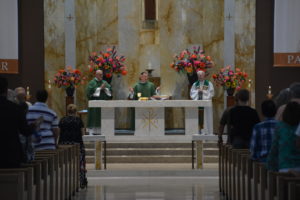To the Tribunal of the Roman Rota: adequate preparation for marriage, “a new catechumenate”
By VISarchive 02
Vatican City, 22 January 2016 (VIS) – This morning in the Clementine Hall the Holy Father received in audience the members of the Apostolic Tribunal of the Roman Rota for the inauguration of the Judicial Year, and reiterated to them that their ministry has always been of great help to the Successor of Peter, “so that the Church, inseparably linked to the family, continues to proclaim the plan of God the Creator and the Redeemer on the sacredness and beauty of the family institution. A mission that is always current, but of special relevance in our time”.
Along with the definition of the Roman Rota as the Tribunal of the Family, the Holy Father emphasised another of its prerogatives as “the Tribunal of the truth of the sacred bond. And these two aspects are complementary. Indeed the Church can show the merciful and indefectible love of God for families, especially those wounded by sin and by the trials of life, and at the same time, proclaim the essential truth of marriage according to God’s plan. This service is entrusted principally to the Pope and the bishops”.
He went on toe refer to the synodal path on the theme of the family that during the last two years has made possible a “profound and wise discernment, thanks to which the Church, among other things, has indicated to the world that there can be no confusion between the family beloved by God and any other type of union”, and highlighted that the activity of the Rota, “both in judging and in contributing to permanent formation, assists and promotes the opus veritatis. When the Church, by means of your service, proposes to declare the truth on marriage in a concrete case, for the good of the faithful, she keeps in mind at the same time those who, by their free choice or through unhappy circumstances live in a state of objective error, continue to receive Christ’s merciful love, and therefore that of the Church herself”.
“The family and the Church, at different levels, contribute to accompanying the human being up to the end of his or her existence. And they do so certainly with the teachings that they transmit, but also with their very nature as communities of love and life. Indeed, if the family can be described as a ‘domestic church’, to the Church we might justly apply the title of the family of God. … Precisely because she is a mother and a teacher, the Church knows that among Christians some have a strong faith, formed by charity, strengthened by good catechesis and nurtured in prayer and sacramental life, whereas others have a weak and neglected faith, unformed, uneducated or forgotten”.
“It should be clearly affirmed that the quality of faith is not an essential condition for matrimonial consent, which according to the longstanding doctrine, can be undermined only at a natural level. Indeed, the habitus fidei is infused in the moment of Baptism and continues to flow mysteriously into the soul, even when the faith is not developed or psychologically appears to be absent. It is not unusual for newly-weds, drawn to marriage by the instinctus naturae, at the moment of celebration have a limited awareness of the fullness of God’s plan, and only later, in family life, discover all that God the Creator and Redeemer has established for them. The lack of formation in faith and also an error regarding the unity, indissolubility and sacramental dignity of marriage may vitiate matrimonial consent only if they determine will. It is precisely for this reason that errors regarding the sacramental nature of marriage must be evaluated very carefully”.
“The Church, therefore, with a renewed sense of responsibility, continues to propose marriage in its essential elements – offspring, the good of spouses, unity, indissolubility, sacramentality – not as an ideal for the few, despite modern models centred on the ephemeral and transitory, but as a reality that, in Christ’s grace, can be lived by all baptised faithful. And therefore this gives greater importance to the pastoral urgency that involves all structures of the Church in convergence towards a common intention, an adequate preparation for marriage, as a sort of new catechumenate, greatly hoped for by some Synod Fathers”.
Source:: Vatican Information Service



